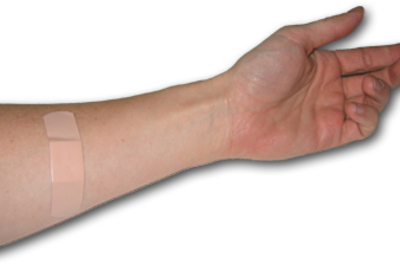Essential oils are beneficial to your health, but as concentrated plant essences they should be handled with care and used in small doses. If you have sensitive skin, check the contraindications before using oils, especially on children and people with skin conditions such as eczema. Allergy sufferers are generally more prone to intolerance, so do a skin patch test before using them on such people.
Time to avoid aromatherapy
Some oils are emmenagogues, affecting menstration, or abortificants, and shouldn't be used by pregnant women. It's best to avoid oils when nursing, as traces may get into the blood and may be transmitted to the baby through the breast milk. If a person is ill, check contraindications first, as the last thing you want to do is worsen the condition by using the wrong oil.
Problematic Constituents of Essential Oils
Some chemical constituents of oils can cause undesired effects, so always check the labels and look at the contraindications before using them.
Aldehydes:
These can irritate skin and lower blood pressure, so use in small doses only
Coumarins:
These have a photosensitising effect can can cause skin pigmentation in bring and UV light.
Ketones:
Research suggests these are toxic in high doses and can provoke epileptic reactions. They are also abotificants.
Lactones:
Phototoxic and skin-sensitising, these can cause skin pigmentation.

Oxides:
These parts of the oil can irritate the skin if present in large quantities.
Phenols:
These constituents can adversely affect the liver if used in large doses and irritate nasal mucous membranes.
Medical Precautions
If you are receiving treatment from your doctor or a specialist, especially if it's for a condition such as heart disease or high blood pressure, do ask them before using aromatherapy. In fact, many health practitioners now recommend aromatherapy, particularly in the form of gentle massage and aromatic baths to reduce the anxiety that can accompany chronic illness.
Heart disease and high blood pressure
there is no evidence that any essential oil will make an existing circulatory problem worse. However, it is advisable to play extra safe by avoiding rosemary and pine oils altogether.
Epilepsy
There is a slight chance that sage, rosemary, fennel and hyssop may provoke seizures in epileptics. But remember that almost any powerful odour may provoke seizures in certain sufferers. So it's sensible for epileptics to avoid inhaling any undiluted essential oil. On the positive side, there isn't a single reported case of anyone having suffered an epileptic seizure as a result of using essential oils in the correct dilution.
During Pregnancy

The question of aromatherapy during pregnancy is contentious. It seems that no two experts can agree. Despite the confusion arising from many schools of thought, there's no evidence to suggest that pregnant women (or their unborn babies) have been harmed by the application of essential oil.
However, it is important to remember that the skin becomes more permeable and sensitive during pregnancy, so always use essential oils in low strength. For example, add no more than 3-4 drops to a bath and 1-2 drops in 5 ml of carrier oil for massage. The quantity also depends on the odour intensity of the chosen oil.
A number of oils are believed to stimulate menstruation and are therefore potentially risky, especially during the first three months of pregnancy. Others potentially over-stimulating to the nervous system, the circulatory system, the liver and kidneys. Its best to avoid skin applications of all essential oils during the first trimester. If in any doubt, consult a qualified aromatherapist.
Babies and Small Children
Although aromatherapy is beneficial for babies and children, unsupervised home use can carry risks. Always see a qualified aromatherapist before using oils on infants and young children.
For children over six, the amount of essential oil used is usually half that recommended for adults. The following oils are particularly suitable for children as they are the least toxic. Lavender, myrtle, chamomile, mandarin and rose otto.
Do a 24 hour patch test of any oil before using it.

Elderly
For frail, elderly people it is advisable to keep to low-strength use of essential oils, as suggested for people on medications, as the elimination of essential oils through the lungs, kidneys and liver may be impaired. So there is an increase risk of toxicity.
Pet care

Use essential oils with great care. Home use of essential oils on animals is not generally recommended as there are great differences between human and animal bodies. There is also a problem of oils being consumed by licking. Seek veterinary advice if you have any reason for concern.
Oil Awareness
Follow these general guidelines for maximum safety when using essential oils, especially on others, but make sure also to always read the label before use.
Use in small doses
Some essential oils can have a toxic effect if they are used in large doses and should therefore only ever be used in the smallest quantities. These oils can also have a negative effect on the liver. Such oils include: Black pepper, cinnamon, clove, nutmeg and thyme.
Irritants or allergies
Some oils are more likely than others to cause a reaction. A skin patch test is the best way to discover if a person can use a particular oil.
Oils likely to cause a reaction: aniseed, rosemary, basil, bergamot, black pepper, thyme, cajeput, carnation, sage, cedarwood, chamomile, ylang ylang, tea tree, cinnamon, nutmeg, citronella, clary sage, clove, eucalyptus, lavender, geranium, ginger, jasmine, juniper, pine, lemon, lemongrass, lime, melissa, neroli.

Do not inhale
Some oils can have a negative effect on the mucous membranes in the nose, and for this reason should not be used in steam inhalations or applied to the skin near the face.
Oils to avoid: Cinnamon, clary sage, clove and marjoram
Photosensitising oils
Some essential oils cause skin pigmentation if applied to skin before exposure to sunlight or ultraviolet light. Such oils should not be used before going out into sunlight or using a sunbed.